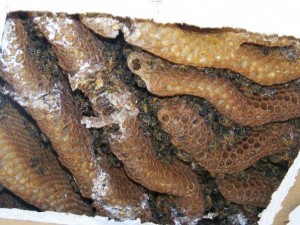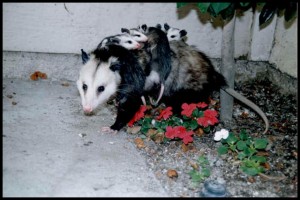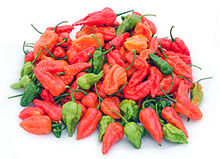READY TO GET STARTED?
REQUEST A FREE ESTIMATE
Fill out the form below or call (888) 466-7849 for a free, no-obligation estimate.
 Last week, we experienced the process of democracy at its best. As a country, we were able to cast our votes on who we thought should be the President of the United States of America for the next four years. But did you know that our electoral process isn’t that much different than the process of how honeybees find a place to live?
Last week, we experienced the process of democracy at its best. As a country, we were able to cast our votes on who we thought should be the President of the United States of America for the next four years. But did you know that our electoral process isn’t that much different than the process of how honeybees find a place to live?
A female scout is sent out to find a new home for the hive. When the scout finds a suitable home that is large enough to store honey with small entrances to keep invaders out, it returns to the current hive to tell the other honeybees about their find. The scout will rave about the new findings by wagging her tail and dancing, this isn’t always the tactic that we see in our own politics but you never know. The scout travels back and forth many times to the prospective site. Each time she returns she continues to wag and dance for the other bees. When her moves are more enthusiastic it is a sign that she still thinks the new site is a great place to live, if her moves get less enthusiastic then the other bees know that she’s not as on board with the new site as she once was. In certain cases, similar to US politics, the scout bee will even head butt other scouts that are trying to convince the hive of going somewhere different.
Eventually, as a group, the bees determine which place is best for the whole group. See, just as with American politics, there is dancing around and even the occasional headbutting but the majority rules on what is for the greater good.
 Some people think that when the temperatures drop, they will have less pest issues. For some critters this may be true, as they use the autumn to store up for a cold winter, during which they hide away. However, some of the larger animals such as squirrels, raccoons, possums, etc., might want to use your home for a warm space to hide away from the weather. Northwest Exterminating’s Wildlife Team knows just what to do in order to keep your home a pest-free zone!
Some people think that when the temperatures drop, they will have less pest issues. For some critters this may be true, as they use the autumn to store up for a cold winter, during which they hide away. However, some of the larger animals such as squirrels, raccoons, possums, etc., might want to use your home for a warm space to hide away from the weather. Northwest Exterminating’s Wildlife Team knows just what to do in order to keep your home a pest-free zone!
Depending on what type of animals may be in your area, they can leave you susceptible to various issues. For instance, some squirrels like to make nests in attics, using your insulation as material! The costs of repair plus the hazards of a potential electrical fire due to damaged wires makes it really necessary to block this area off from potential unwanted guests. Aside from squirrels, other creatures have the potential to do damage in the form of bites or fleas that might affect your children or pets.
To reduce these risks against you, Northwest’s Wildlife Team specializes in wildlife exclusion. One of form of wildlife exclusion involves sealing up any potential openings to secure your home. The Wildlife Team will inspect your home, evaluating potential problem areas and implementing measures to eliminate these issues. However, if by chance your home has already gotten unsolicited attention from these pests, the Wildlife Team knows just what to do to take care of your home and prevent the issue from happening in the future. If you need a Wildlife representative, please contact us at 888-466-7849 or visit our website www.callnorthwest.com
Source: http://ezinearticles.com/?The-Importance-of-Wildlife-Exclusion&id=7352650
Melissa Brown
[email protected]
 Researchers in Missoula, Montana are testing to see if hot peppers will keep deer mice from eating grass seeds. Research scientist, Dean Pearson with the U.S. Forest Service’s Rocky Mountain Research Station is trying out different methods of attaching powder from the bhut jolokia pepper to the seeds of native grass. The bhut jolokia pepper is one of the hottest peppers known to man. Some success has been found in using the pepper to keep mice away from the grass seeds after planting.
Researchers in Missoula, Montana are testing to see if hot peppers will keep deer mice from eating grass seeds. Research scientist, Dean Pearson with the U.S. Forest Service’s Rocky Mountain Research Station is trying out different methods of attaching powder from the bhut jolokia pepper to the seeds of native grass. The bhut jolokia pepper is one of the hottest peppers known to man. Some success has been found in using the pepper to keep mice away from the grass seeds after planting.
The team of researchers will return to Missoula next spring to see if the peppered seeds have survived the hungry mice. Benefits to this would be cost effective agriculture applications and the use of native seeds instead of exotic seed.
To read the full article click HERE.
 At Northwest, we are committed to creating healthier living and working environments. Below, we have some practical tips you can try at home to improve your carbon footprint!
At Northwest, we are committed to creating healthier living and working environments. Below, we have some practical tips you can try at home to improve your carbon footprint!
1. Don’t drink bottled water
You may just be using one bottle of water a day whenever you head to the gym, but multiply that by a couple billion and you realize that all that plastic is a waste! Though recycling them is a great option, an even better one is to get a reusable bottle and an in-house filtration system to get water from the tap.
2. Unplug it!
We have habit of leaving electronics plugged in when we are at work or not using them. A great way to save energy would be to unplug our cellphone chargers, laptops, TVs and anything that won’t be in use. Using a power strip can make this process simpler for you – one flip and it’s on or off!
3. The Three Rs: Reduce, Reuse, Recycle
Following these three steps can help you spend less money, make less of an impact on the environment and get creative! Reducing means using less wasteful products, reusing means making use of what you already have and recycling means making your old stuff into something brand new!
4. Cold water works wonders
You may not want to shiver when you shower, but when doing laundry, washing with cold water reduces energy output. Many laundry detergents nowadays are available just for the purpose of being used with cold water so don’t worry about not getting your clothes as clean.
5. Use the microwave less
Using fresh foods or foods that don’t require microwaving eliminates waste in many ways. First, you don’t use the energy the microwave requires. Additionally, many microwaveable items come with packaging that uses paper products and plastic. Reducing how often you use the microwave ensures that you avoid using these products as well.
Hopefully these tips will get you motivated to go green! Aside from these tips, Northwest Exterminating offers many services that are environmentally and customer friendly! We want to protect your homes from pests, while keeping the environment healthy. Our Green Services include TAP Attic Insulation, Green Pest Control, Complete CrawlSpace, Green Mosquito, and Green Termite Solutions. If you want to know more, please visit www.callnorthwest.com/green-services
Melissa Brown
[email protected]
Sources: